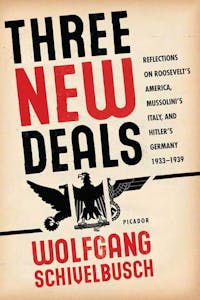Three New Deals
Reflections on Roosevelt's America, Mussolini's Italy, and Hitler's Germany, 1933-1939
 Download image
Download image
ISBN10: 0312427433
ISBN13: 9780312427436
Trade Paperback
256 Pages
$19.00
CA$26.00
Today Franklin Delano Roosevelt's New Deal is regarded as the democratic ideal, the positive American response to a crisis that propelled Germany and Italy toward National Socialism and Fascism. Yet in the 1930s, shocking as it may now seem, these regimes were not considered entirely antithetical. In his book, Wolfgang Schivelbusch investigates the shared elements of these three "new deals" to offer an original explanation for the popularity of Europe's totalitarian systems.
By reconstructing Depression-era attitudes toward security and government, Schivelbusch traces the emergence of a new type of state—one bolstered by mass propaganda, led by a charismatic figure, and designed to project stability and power. The gigantic public works programs favored by all three regimes not only put people back to work, they also convinced them of the government's unshakeable authority.
Schivelbusch uncovers stunning commonalities: the symbolic importance of the TVA dams, the German autobahn, and the reclamation of the Pontine marshes; the seductive persuasiveness of Roosevelt's fireside chats and Hitler's mass rallies; the vogue for monumental architecture; the omnipresent banners, badges, and buttons enlisting citizens as loyal followers and supporters of the state.
Schivelbusch does not equate the political systems identified with Roosevelt, Hitler, and Mussolini or minimize their acute differences. Rather, by exploring their similarities, he both deepens our understanding of the New Deal and puts forward a provocative explanation for the still-mysterious popularity of Europe's most tyrannical regimes.
Reviews
Praise for Three New Deals
"Schivelbusch is a brilliant cultural historian . . . who brings a comparative cultural focus to the 1930s with fascinating and provocative ideas."—Los Angeles Times Book Review
"What does a nation's architecture tell us about the nation itself? Quite a lot, in Wolfgang Schivelbusch's estimation. In fact, the author compares the edifices built to celebrate the triumphalism of fascism in Italy and Nazism in Germany, and the social progressivism of the New Deal in the United States, and finds the similarities astonishing. Schivelbusch, a cultural historian whose previous works, notably The Culture of Defeat, earned important attention, posits that all three countries shared common characteristics in response to the Great Depression: charismatic leadership, enormous public works projects, a focus on monumental architecture, a 'new ideal' for the common man and propaganda that shored up the image of government's unshakable authority. Controversial, well written and convincing, this is historical analysis at its most invigorating."—Minneapolis Star Tribune
"Can the New Deal possibly have anything in common with Nazism and Fascism? Yes, argues Schivelbusch, winner of German's Heinrich Mann Prize, who points out that all three were spearheaded by a charismatic man who relied on mass propaganda to get his ideas across."—Library Journal


